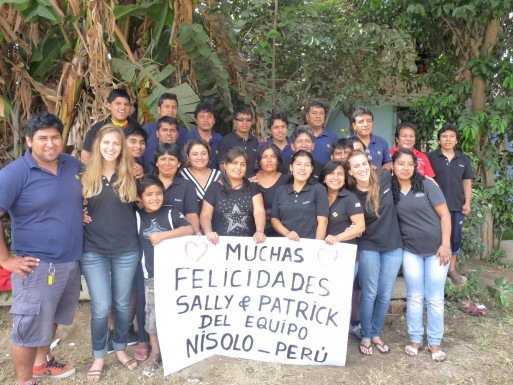Name: Kate Pellegrino
Major: Psychology Minor: Social Entrepreneurship & International Affairs
Graduation Year: December 2014
Co-op: Nisolo in Trujillo, Peru
Favorite quote about social change:
“Social entrepreneurs are not content just to give a fish or teach how to fish. They will not rest until they have revolutionized the fishing industry.” – Bill Drayton, founder of Ashoka.
Tell us about your co-op:
I spent 6 months in Trujillo, Peru working with a social business called Nisolo, a leather products company with the mission to provide long-term, sustainable, and better-paying jobs to local shoemakers.
On my second day of work I was confronted with my first project. Every Saturday the workers were paid, but there wasn’t a very consistent or well-organized means of documenting said pay. As such, I designed a simple spreadsheet to record on a weekly basis what each worker produced and earned for said work. This document is still in use today although I am no longer working with the company.
Along with assisting in the delivery of weekly payments, I managed the process of exporting two shipments of 3,000 plus pairs of shoes. My tasks ranged from packing and quality control to completing all necessary paperwork for customs in Peru and the United States. Once I understood the processes more fully and became more acquainted with the culture and dynamics of the organization, I took on the responsibility of planning production.
Did you face any challenges?
I spent the first month learning and absorbing as much as I possibly could about the shoe-making process and how it varied depending on each product. Although I speak Spanish fluently, having grown up primarily in South America, it was initially a challenge to pick up the vernacular of an industry in which I had never worked.
Additionally, within a couple of months I realized that there wasn’t a particularly effective or organized means of tracking production. In fact, almost all assignments were given to the workers by word of mouth or written on a piece of paper with no copies made. This created a number of challenges, particularly when my supervisor in the US wanted to know how far along we were with specific products. As such, I created a template for handing out “despacho” and eventually took on the task of planning production myself.
What did you learn?
By the end of my co-op, I was an ingrained member of the team and considered a vital part of the management structure, making executive decisions on the work flow based on the availability of materials, the skillset of each of our workers, and the amount of time it took to move items through the production line.
I now intricately understand shoemaking and leather handling; however, my most important lessons were of a cultural nature. Peruvians are much more indirect and relationship-oriented than Americans. As such, I had to adjust my own style of working to match that of my co-workers. I learned to ask the same question in different ways to get the answer I needed. I also took the time to build a relationship with each worker, even if it simply meant saying good morning every day. As someone who hopes to build a career in an international setting, these lessons are invaluable to me.
My time with Nisolo can only be characterized as chaotic, rewarding, challenging, and fulfilling; and I would do it all again in a heartbeat!
To learn more about Nisolo, please visit www.nisolo.com.



